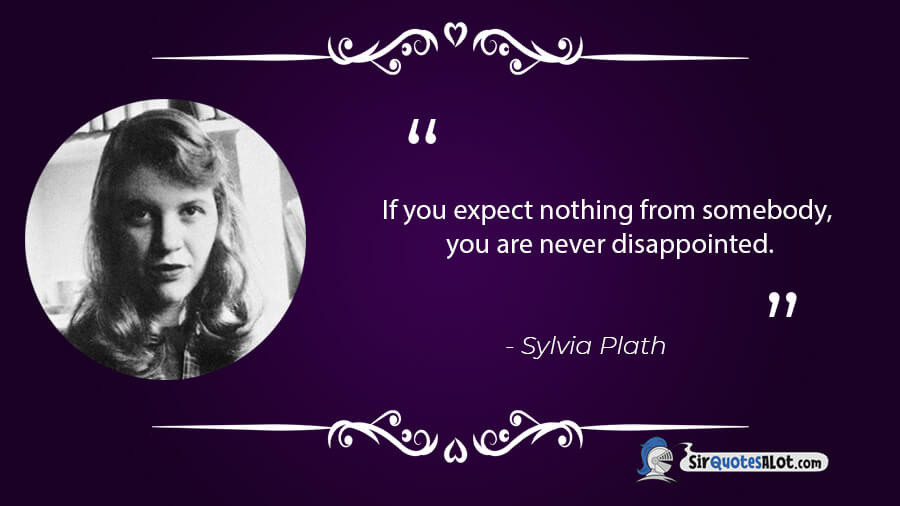In this article, we share with you some of the best and most inspiring Sylvia Plath quotes on life, love, feminism, death and other topics.
Sylvia Plath was born on October 27, 1932 in Boston, Massachusetts, U.S. She was a novelist, poet, short-story writer and known for advancing the confessional poetry genre.
Plath’s most known works and publications are “The Colossus and Other Poems” (1960) and “Ariel” (1965). She is also known for “The Bell Jar” which was published just before she died and is a semi-autobiographical novel. In 1981, works that were previously unpublished saw light in the collection “The Collected Poems” which won the Pulitzer Prize in poetry in 1982.
She attended and studied at Smith College in Massachusetts as well as at Newnham College in Cambridge, England. Plath got married in 1956 to Ted Hughes who was also a poet and the two lived in USA and later in England.
The two had two children, however, the marriage and relationship between Plath and Hughes wasn’t healthy (to say the least) and in letter, she described how he used to abuse her and how she suffered. In 1962, they separated.
Most her adult life, Sylvia Plath suffered from clinical depression and was even treated a few time with electroconvulsive therapy (ECT). Unfortunately, in 1963, Sylvia Plath killed herself.
Here is a sneak peek at the quotes in this article:
Sylvia Plath Quotes on Life
Remember, remember, this is now, and now, and now. Live it, feel it, cling to it. I want to become acutely aware of all I’ve taken for granted.
I want to taste and glory in each day, and never be afraid to experience pain; and never shut myself up in a numb core of nonfeeling, or stop questioning and criticizing life and take the easy way out. To learn and think: to think and live; to live and learn: this always, with new insight, new understanding, and new love.
I can never read all the books I want; I can never be all the people I want and live all the lives I want. I can never train myself in all the skills I want. And why do I want? I want to live and feel all the shades, tones and variations of mental and physical experience possible in my life. And I am horribly limited.
If you expect nothing from somebody you are never disappointed.
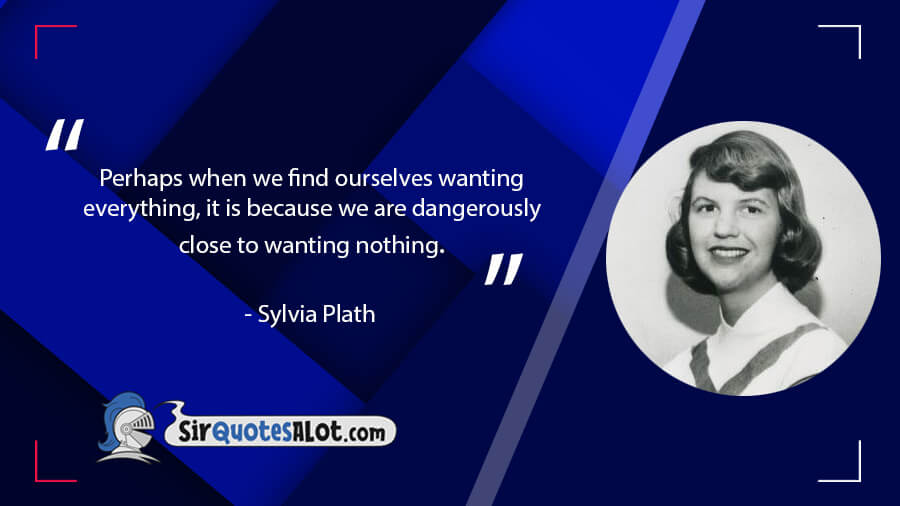
Perhaps when we find ourselves wanting everything, it is because we are dangerously close to wanting nothing.
I have the choice of being constantly active and happy or introspectively passive and sad. Or I can go mad by ricocheting in between.
I wonder why I don’t go to bed and go to sleep. But then it would be tomorrow, so I decide that no matter how tired, no matter how incoherent I am, I can skip on hour more of sleep and live.
Life has been some combination of fairy-tale coincidence and joie de vivre and shocks of beauty together with some hurtful self-questioning.
So much working, reading, thinking, living to do! A lifetime is not long enough.
What is my life for and what am I going to do with it? I don’t know and I’m afraid. I can never read all the books I want; I can never be all the people I want and live all the lives I want.
I have stitched life into me like a rare organ.
I saw the years of my life spaced along a road in the form of telephone poles threaded together by wires. I counted one, two, three… nineteen telephone poles, and then the wires dangled into space, and try as I would, I couldn’t see a single pole beyond the nineteenth.
It is as if my life were magically run by two electric currents: joyous positive and despairing negative–which ever is running at the moment dominates my life, floods it.
There are times when a feeling of expectancy comes to me, as if something is there, beneath the surface of my understanding, waiting for me to grasp it. It is the same tantalizing sensation when you almost remember a name, but don’t quite reach it. I can feel it when I think of human beings, of the hints of evolution suggested by the removal of wisdom teeth, the narrowing of the jaw no longer needed to chew such roughage as it was accustomed to; the gradual disappearance of hair from the human body; the adjustment of the human eye to the fine print, the swift, colored motion of the twentieth century. The feeling comes, vague and nebulous, when I consider the prolonged adolesence of our species; the rites of birth, marriage and death; all the primitive, barbaric ceremonies streamlined to modern times. Almost, I think, the unreasoning, bestial purity was best. Oh, something is there, waiting for me. Perhaps someday the revelation will burst in upon me and I will see the other side of this monumental grotesque joke. And then I’ll laugh. And then I’ll know what life is.
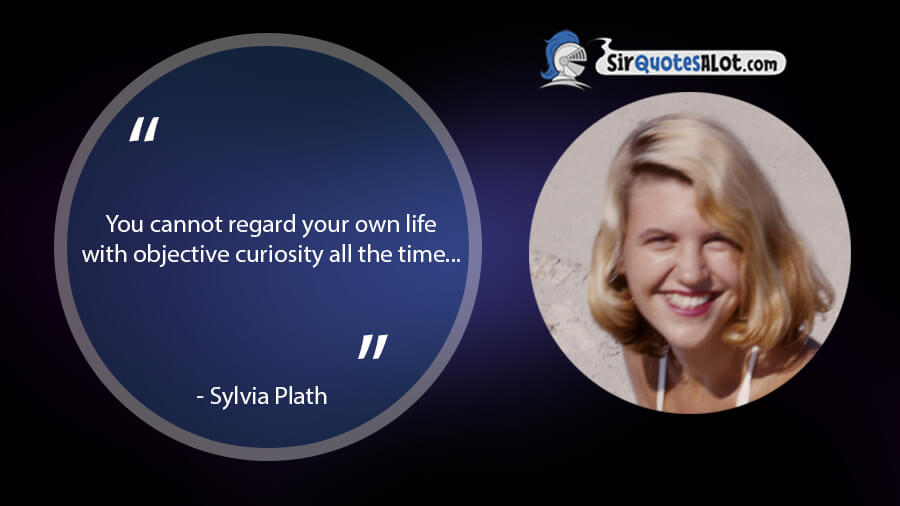
You cannot regard your own life with objective curiosity all the time…
Life was not to be sitting in hot amorphic leisure in my backyard idly writing or not-writing, as the spirit moved me. It was, instead, running madly, in a crowded schedule, in a squirrel cage of busy people. Working, living, dancing, dreaming, talking, kissing – singing, laughing, learning.
The silence drew off, baring the pebbles and shells and all the tatty wreckage of my life.
I want to live and feel all the shades, tones and variations of mental and physical experience possible in life.
To learn and think; to think and live; to live and learn: this always, with new insight, new understanding, and new love.
Ready for a new life.
Sylvia Plath Quotes on Love
I want so obviously, so desperately to be loved, and to be capable of love.
If you love her,’ I said, ‘you’ll love somebody else someday.
There I went again, building up a glamorous picture of a man who would love me passionately the minute he met me, and all out of a few prosy nothings.
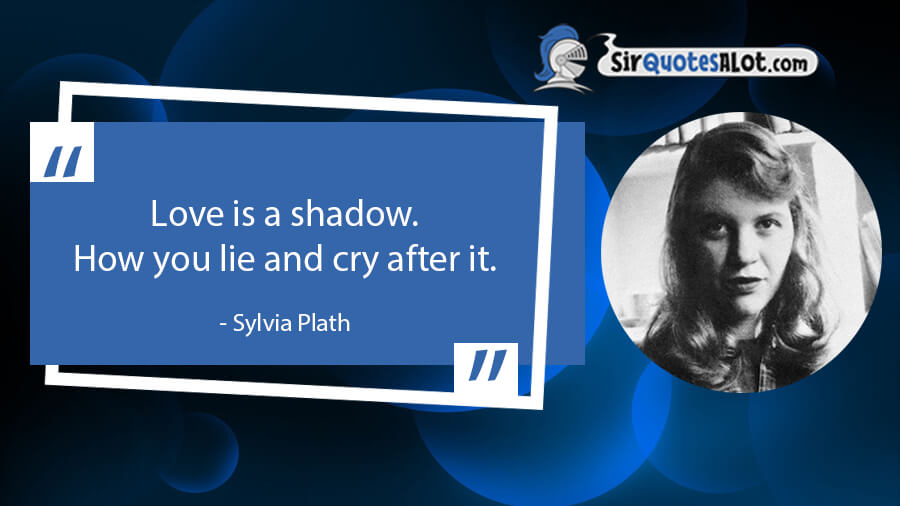
Love is a shadow. How you lie and cry after it.
I shut my eyes, and the music broke over me like a rainstorm. Marco’s leg slid forward against mine and my leg slid back and I seemed to be riveted to him, limb for limb, moving as he moved, without any will or knowledge of my own, and after a while I thought, ‘It doesn’t take two to dance, it only takes one,’ and I let myself blow and bend like a tree in the wind.
…love knows not of death nor calculus above the simple sum of heart plus heart.
I have room in me for love. And for ever so many little lives.
Love is a desperate artifice to take the place of those two original parents who turned out not to be omnisciently right gods.
How we need another soul to cling to, another body to keep us warm. To rest and trust; to give your soul in confidence: I need this, I need someone to pour myself into.
If they substituted the word ‘Lust’ for ‘Love’ in the popular songs it would come nearer the truth.
Kiss me, and you will see how important I am.
Yes, I was infatuated with you: I am still. No one has ever heightened such a keen capacity of physical sensation in me. I cut you out because I couldn’t stand being a passing fancy. Before I give my body, I must give my thoughts, my mind, my dreams. And you weren’t having any of those.
Can you understand? Someone, somewhere, can you understand me a little, love me a little? For all my despair, for all my ideals, for all that – I love life. But it is hard, and I have so much – so very much to learn.
I have never found anybody who could stand to accept the daily demonstrative love I feel in me, and give back as good as I give.
I do not love; I do not love anybody except myself. That is a rather shocking thing to admit. I have none of the selfless love of my mother. I have none of the plodding, practical love… I am, to be blunt and concise, in love only with myself, my puny being with its small inadequate breasts and meager, thin talents. I am capable of affection for those who reflect my own world.
I feel good with my husband: I like his warmth and his bigness and his being-there and his making and his jokes and stories and what he reads and how he likes fishing and walks and pigs and foxes and little animals and is honest and not vain or fame-crazy and how he shows his gladness for what I cook him and joy for when I make him something, a poem or a cake, and how he is troubled when I am unhappy and wants to do anything so I can fight out my soul-battles and grow up with courage and a philosophical ease. I love his good smell and his body that fits with mine as if they were made in the same body-shop to do just that. What is only pieces, doled out here and there to this boy and that boy, that made me like pieces of them, is all jammed together in my husband. So I don’t want to look around any more: I don’t need to look around for anything.
Living with him is like being told a perpetual story: his mind is the biggest, most imaginative I have ever met. I could live in its growing countries forever.
What did my fingers do before they held him?
What did my heart do, with its love?
The blood of love welled up in my heart with a slow pain.
There is so much hurt in this game of searching for a mate, of testing, trying. And you realize suddenly that you forgot it was a game, and turn away in tears.
What a man wants is a mate and what a woman wants is infinite security,’ and, ‘What a man is, is an arrow into the future and what a woman is, is the place the arrow shoots off from.
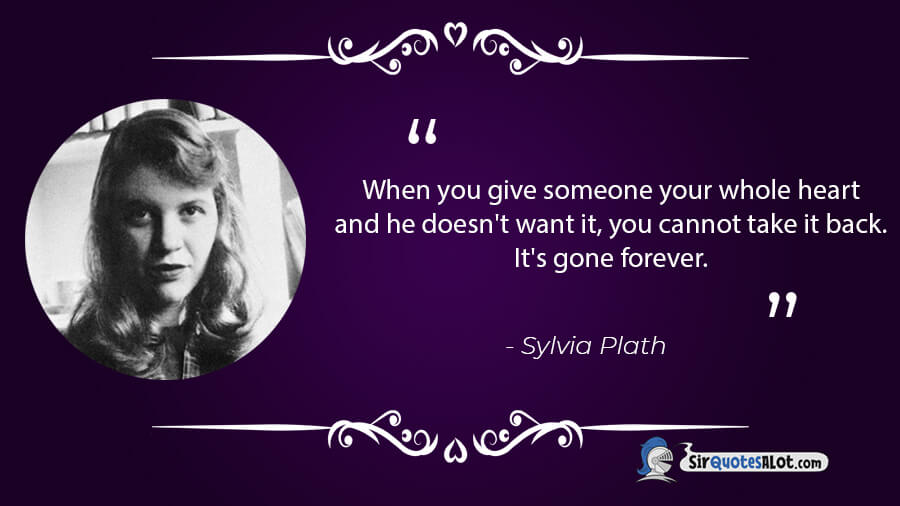
When you give someone your whole heart and he doesn’t want it, you cannot take it back. It’s gone forever.
And I am aware of my heart: it opens and closes
Its bowl of red blooms out of sheer love of me.
I am inhabited by a cry.
Nightly it flaps out
Looking, with its hooks, for something to love.
I was my own woman.
The next step was to find the proper sort of man.
O love, how did you get here?
I need more than anything right now what is, of course, most impossible, someone to love me, to be with me at night when I wake up in shuddering horror and fear of the cement tunnels leading down to the shock room, to comfort me with an assurance that no psychiatrist can quite manage to convey.
Clouds pass and disperse.
Are those the faces of love, those pale irretrievable?
Is it for such I agitate my heart?
Sylvia Plath Quotes on Feminism
Girls are not machines that you put kindness coins into and sex falls out.
What horrifies me most is the idea of being useless: well-educated, brilliantly promising, and fading out into an indifferent middle age.
Let me live, love and say it well in good sentences.
I am too pure for you or anyone.
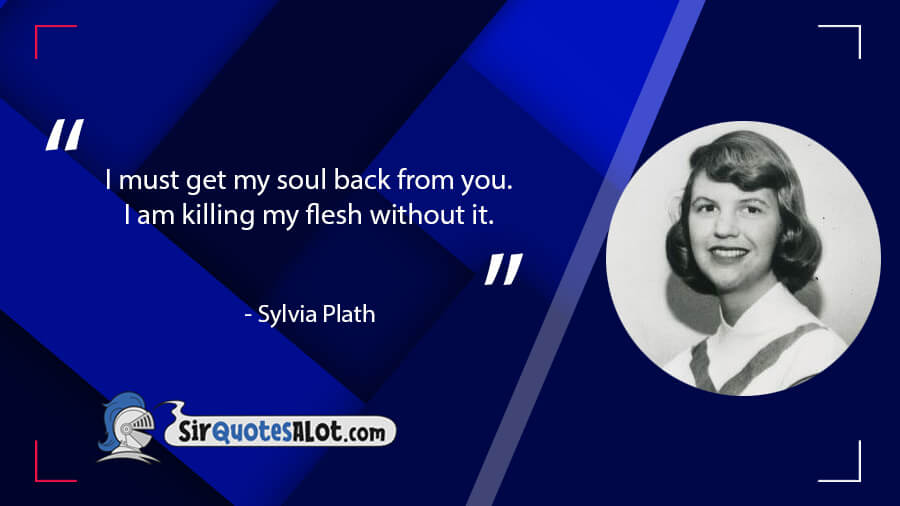
I must get my soul back from you. I am killing my flesh without it.
So I began to think maybe it was true that when you married and had children it was like being brainwashed, and afterward you went about as numb as a slave in a totalitarian state.
I lean to you numb as a fossil. Tell me I’m here.
Out of the ash I rise with my red hair and I eat men like air.
Being born a woman is my awful tragedy. From the moment I was conceived I was doomed to sprout breasts and ovaries rather than penis and scrotum; to have my whole circle of action, thought and feeling rigidly circumscribed by my inescapable feminity. Yes, my consuming desire to mingle with road crews, sailors and soldiers, bar room regulars–to be a part of a scene, anonymous, listening, recording–all is spoiled by the fact that I am a girl, a female always in danger of assault and battery. My consuming interest in men and their lives is often misconstrued as a desire to seduce them, or as an invitation to intimacy. Yet, God, I want to talk to everybody I can as deeply as I can. I want to be able to sleep in an open field, to travel west, to walk freely at night…
if a man chooses to be promiscuous, he may still turn up his nose at promiscuity. He may still demand a woman be faithful to him, to save him from his own lust. But women have lust, too. Why should they be relegated to the position of custodian of emotions, watcher of the infants, feeder of soul, body and pride of man?
“Neurotic, ha!” I let out a scornful laugh. “If neurotic is wanting two mutually exclusive things at one and the same time, then I’m neurotic as hell. I’ll be flying back and forth between one mutually exclusive thing and another for the rest of my days.
And I knew that in spite of all the roses and kisses and restaurant dinners a man showered on a woman before he married her, what he secretly wanted was for her to flatten out underneath his feet like Mrs. Willard’s kitchen mat.
Sylvia Plath Quotes on Death
Tomorrow is another day toward death.
Dying
Is an art, like everything else.
I do it exceptionally well.
I do it so it feels like hell.
I do it so it feels real.
I guess you could say I have a call.
Death must be so beautiful. To lie in the soft brown earth, with the grasses waving above one’s head, and listen to silence. To have no yesterday, and no tomorrow. To forget time, to forgive life, to be at peace.
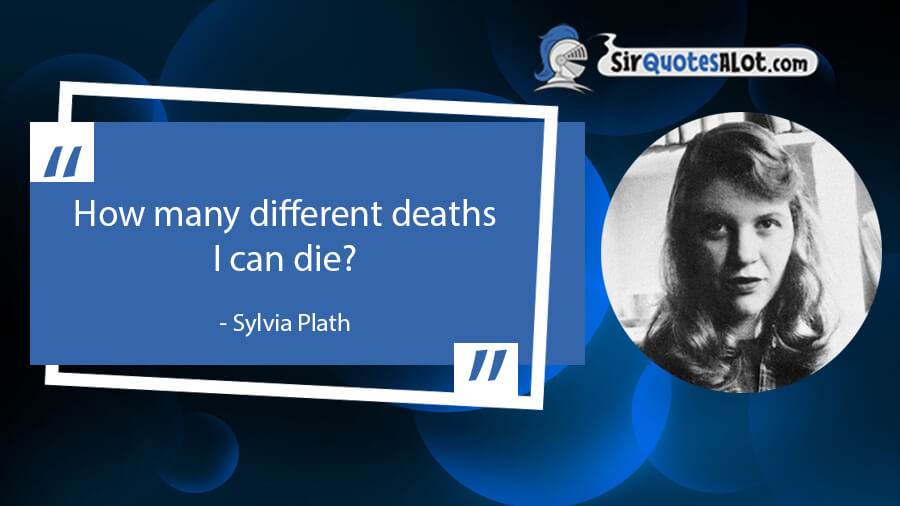
How many different deaths I can die?
Why do we electrocute men for murdering an individual and then pin a purple heart on them for mass slaughter of someone arbitrarily labeled ‘enemy’?
I told him I believed in hell, and that certain people, like me, had to live in hell before they died, to make up for missing out on it after death, since they didn’t believe in life after death, and what each person believed happened to him when he died.
A summer calm laid its soothing hand over everything, like death.
I have always been extremely fond of the definition of Death which says it is: Inaccessibility to Experience.
The trouble about jumping was that if you didn’t pick the right number of storeys, you might still be alive when you hit bottom.
The thought that I might kill myself formed in my mind coolly as a tree or a flower.
The night sky is only a sort of carbon paper,
Blueblack, with the much-poked periods of stars
Letting in the light, peephole after peephole—
A bonewhite light, like death, behind all things.
The human mind is so limited it can only build an arbitrary heaven — and usually the physical comforts they endow it with are naively the kind that can be perceived as we humans perceive — nothing more. No: perhaps I will awake to find myself burning in hell. I think not. I think I will be snuffed out. Black is sleep; black is a fainting spell; and black is death, with no light, no waking.
My flesh winced, in cowardice, from such a death.
I had hoped to make her strong and healthy, and now she may be too weak herself after this slow death, like my father’s slow long death, to come to me. and I am here, futile, cut off from the ritual of family love and neighborhood and from giving strength and love to my dear brave grandmother’s dying whom I loved above thought. and my mother will go, and there is the terror of having no parents, no older seasoned beings, to advise and love me in this world.
saw myself sitting in the crotch of this fig tree, starving to death, just because I couldn’t make up my mind which of the figs I would choose. I wanted each and every one of them, but choosing one meant losing all the rest, and, as I sat there, unable to decide, the figs began to wrinkle and go black, and, one by one, they plopped to the ground at my feet.
Sylvia Plath Quotes on Loneliness and Depression
I am helpless as the sea at the end of her string. I am restless. Restless and useless. I, too, create corpses.
I may never be happy, but tonight I am content.
To the person in the bell jar, blank and stopped as a dead baby, the world itself is the bad dream.
Because wherever I sat—on the deck of a ship or at a street café in Paris or Bangkok—I would be sitting under the same glass bell jar, stewing in my own sour air.
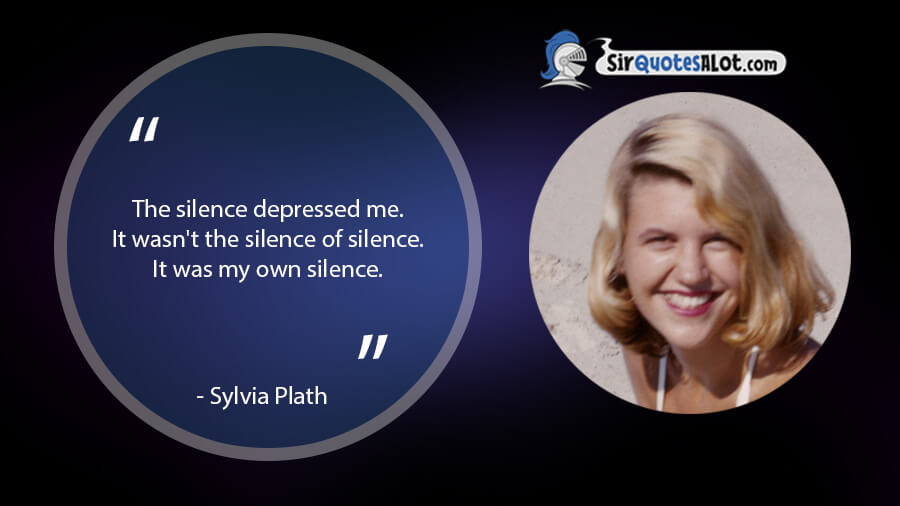
The silence depressed me. It wasn’t the silence of silence. It was my own silence.
I didn’t know why I was going to cry, but I knew that if anybody spoke to me or looked at me too closely the tears would fly out of my eyes and the sobs would fly out of my throat and I’d cry for a week. I could feel the tears brimming and sloshing in me like water in a glass that is unsteady and too full.
I couldn’t see the point of getting up. I had nothing to look forward to.
I felt myself melting into the shadows like the negative of a person I’d never seen before in my life.
I felt like a racehorse in a world without racetracks or a champion college footballer suddenly confronted by Wall Street and a business suit, his days of glory shrunk to a little gold cup on his mantel with a date engraved on it like the date on a tombstone.
Yes, there is joy, fulfilment and companionship—but the loneliness of the soul in its appalling self-consciousness is horrible and overpowering.
And the danger is that in this move toward new horizons and far directions, that I may lose what I have now, and not find anything except loneliness.
I feel outcast on a cold star, unable to feel anything but an awful helpless numbness.
I am afraid. I am not solid, but hollow. I feel behind my eyes a numb, paralyzed cavern, a pit of hell, mimicking nothingness. I never thought. I never wrote, I never suffered.
And I sit here without identity: faceless. My head aches.
I thought the most beautiful thing in the world must be shadow, the million moving shapes and cul-de-sacs of shadow. There was shadow in bureau drawers and closets and suitcases, and shadow under houses and trees and stones, and shadow at the back of people’s eyes and smiles, and shadow, miles and miles and miles of it, on the night side of the earth.
I am terrified by this dark thing that sleeps in me; All day I feel its soft, feathery turnings, its malignity.
I can’t deceive myself that out of the bare stark realization that no matter how enthusiastic you are, no matter how sure that character is fate, nothing is real, past or future, when you are alone in your room with the clock ticking loudly into the false cheerful brilliance of the electric light.
And if you have no past or future which, after all, is all that the present is made of, why then you may as well dispose of the empty shell of present and commit suicide.
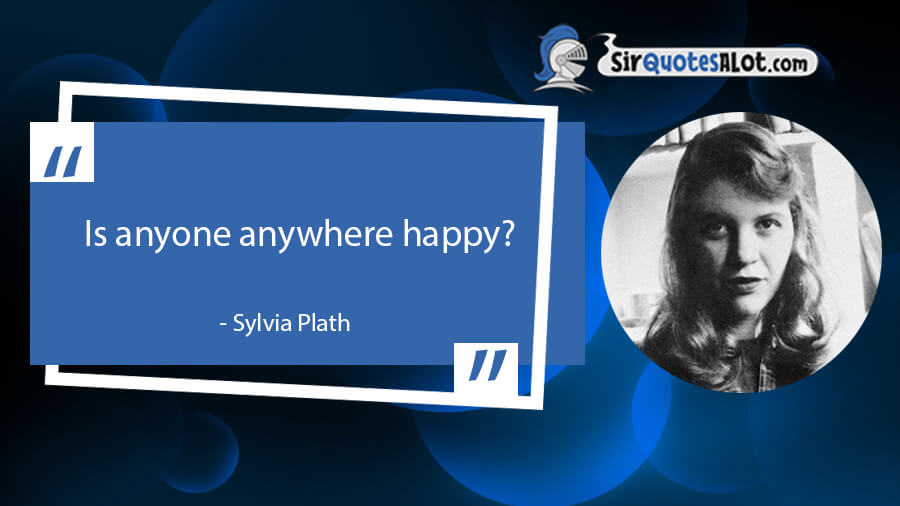
Is anyone anywhere happy?
I’ll never speak to God again.
They had to call and call and pick the worms off me like sticky pearls.
I moved in front of the medicine cabinet. If I looked in the mirror while I did it, it would be like watching somebody else, in a book or a play.
The one thing I was good at was winning scholarships and prizes, and that era was coming to an end.
The reason why I hadn’t washed my clothes or my hair was because it seemed so silly.
I saw the days of the year stretching ahead like a series of bright, white boxes, and separating one box from another was sleep, like a black shade. Only for me, the long perspective of shades that set off one box from the next had suddenly snapped up, and I could see day after day glaring ahead of me like a white, broad, infinitely desolate avenue.
It seemed silly to wash one day when I would only have to wash again the next.
It made me tired just to think of it.
I wanted to do everything once and for all and be through with it.
The eyes and the faces all turned themselves towards me, and guiding myself by them, as by a magical thread, I stepped into the room.
Interesting Facts about Sylvia Plath
Time to have a look at some interesting Sylvia Plath facts that may even surprise you.
- Sylvia Plath Wrote Books for Children – Besides poems, Sylvia Plath wrote children’s books as well. She had a collection of stories for children and this collection was found along with her papers and journals. All of the books for children were published after Plath died. Among the stories are “The It-Doesn’t-Matter-Suit”, which tells the story of Max Nix and his suit which is mustard yellow.
- Sylvia Plath Published Her First Poem at the Age of 8 Years Old – Plath’s first poem was published in the children section of the Boston Herald in 1941, meaning that Plath was only 8 years old. The poem is titled “Poem” and it goes like this:
“Hear the crickets chirping
In the dewy grass.
Bright little fireflies
Twinkle as they pass.” - Plath’s Poems about Bees Were Inspired by Her Father – Plath’s father (Otto Plath) emigrated to the US from Germany when he was a teenager. He became a professor of Entomology at the University of Boston and also a prestigious bee keeper, a real authority when it came to bumble bees.
Sylvia’s father influenced her work a lot, and one of her most famous poems is titled “Daddy”. Unfortunately, Otto died when Sylvia was only 8 years old of complications from diabetes that was late-diagnosed. This was very hard for Sylvia and she battled with this loss all of her life.
In 1962, she wrote 5 poems in less than a week known as “The Bee Poems” that were inspired by her father. - Sylvia Plath Was a “Guest Editor” at Mademoiselle Magazine – When Plath studied at Smith College, she won a contest and in 1953, became one of only few “guest editors” at the magazine. This experience turned out to be a turning point in her life. She described this experience and her time there as “pain, parties, work”. When she returned back to Boston, Plath experienced great depression and even survived a suicide attempt. She was institutionalized for a short period of time, but did get back to school and even graduated with honors.
- A Phenomenon Was Named After Plath – In 2001, psychiatrist James C. Kaufman named a phenomenon by the name of “The Sylvia Plath Effect”, but then regretted it. This came to describe depressed poets, but later on Kaufman took it back, saying he was “young and stupid” at the time.
- Plath’s Headstone Has Been Vandalized Over and Over Again – Sylvia’s Plath grave is located in the West Yorkshire hills of England, however, time and time again it has been vandalized and tempered with. An example is that her married name was expunged with an attempt to remove Ted Hughes from her narrative.
- Plath Continues to Influence and Impact Even in These Days – Since her death, Sylvia Plath has been influencing culture. That’s 60 years! Her words and quotes feature on Twitter, blogs, and she even influenced other writers like Lena Dunham who wrote a paper in college where she compared between Sylvia Plath and Alanis Morissette. Joyce Carol Oates also wrote about Plath extensively.
If you enjoyed this article, we also suggest you visit our article featuring Emily Dickinson quotes.

